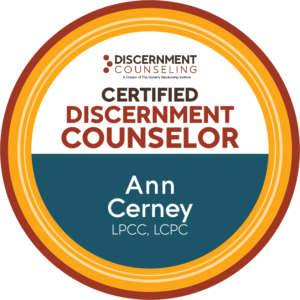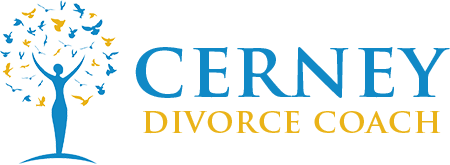Discernment Counseling - Developed by Dr. Bill Doherty at the University of Minnesota, in the study titled “Couples on the Brink”
When one spouse is not sure they want to stay married AND doubts that couples therapy can help, then Discernment Counseling is exactly where you belong.
The leaning-out partner is supported where they are emotionally, and the leaning-in spouse is equally supported in their own emotional state. Discernment Counseling avoids starting half-hearted couples therapy and accepts ambivalence rather than trying to work around it or overcome it.
Leaning Out Partner –
You are strongly considering ending your marriage/LTR. This is a major decision, one you never wanted to make. Understandably, you are
- Paralyzed by fear and confusion
- Hopeless about a future together
- Ambivalent about leaving, or staying

Leaning In Partner –
Your spouse wants a divorce/separation. You do not want your marriage/LTR to end. Even if you saw this coming, you feel
- Powerless, like you have no choice in the matter
- Rejection over being ‘left’
- Devastated and confused, what did you do ‘wrong’?
Ending a marriage or LTR is traumatic regardless of whether you’re leaning in or leaning out. Discernment counseling is a brief, time limited process – no more than 5 sessions. The goal is to come to a decision about how to proceed with the relationship.
There are 3 paths from which to choose:
- Status Quo – do nothing, do not separate, divorce, or commit to working on the relationship
- Separate/Divorce – define and take next steps toward this decision
- Recommit to the relationship – Work on the relationship 100%, all discussion of leaving off the table, for a specified period of time. Reassess at the end of that time.
A majority of the work is done with Ann 1:1, though you will come in together (or zoom). At every meeting, we intermix short exposures together as a couple to summarize and gain understanding of the 1:1 discussions. Discernment counseling is an evidence-based process, developed by Bill Doherty, at the Doherty Institute, the University of Minnesota.
If you want to understand exactly what happened in and to your relationship, and especially your role in its evolution, Discernment Counseling is an excellent solution.
If you choose path 3, staying together, you will commit to working on the relationship with the knowledge gained in this process. If you decide to separate or divorce, path 2, you will both be better equipped to avoid making the same mistakes in future relationships. That is worth the work.

